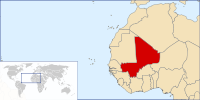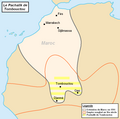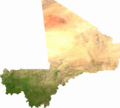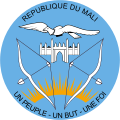
Back بوابة:مالي Arabic Portail:Mali BM Portal:Mali Spanish Portail:Mali French Portal:Mali Portuguese Портал:Мали Russian باب:مالی Urdu
The Mali Portal
Mali, officially the Republic of Mali, is a landlocked country in West Africa. It is the eighth-largest country in Africa, with an area of over 1,241,238 square kilometres (479,245 sq mi). The country is bordered to the north by Algeria, to the east by Niger, to the northwest by Mauritania, to the south by Burkina Faso and Ivory Coast, and to the west by Guinea and Senegal. The population of Mali is 24,478,595,0 47.19% of which are estimated to be under the age of 15 in 2024. Its capital and largest city is Bamako. The country has 13 official languages, of which Bambara is the most commonly spoken. The sovereign state's northern borders reach deep into the middle of the Sahara Desert. The country's southern part, where the majority of inhabitants live, is in the Sudanian savanna and has the Niger and Senegal rivers running through it. The country's economy centres on agriculture and mining with its most prominent natural resources including gold (of which it is the third largest producer in Africa) and salt. Mali was part of three successive powerful and wealthy West African empires that controlled trans-Saharan trade: the Ghana Empire (for which Ghana is named), the Mali Empire (for which Mali is named), and the Songhai Empire. At its peak in 1300, the Mali Empire was the wealthiest country in Africa with its 14th-century emperor Mansa Musa believed to be one of the wealthiest individuals in history. Besides being a hub of trade and mining, medieval Mali was a centre of Islam, culture and knowledge, with Timbuktu becoming a renowned place of learning with its university, one of the oldest in the world and still active. The expanding Songhai Empire absorbed the empire in 1468, followed by a Saadian army which defeated the Songhai in 1591. In the late 19th century, during the Scramble for Africa, France seized control of Mali, making it a part of French Sudan; as the Sudanese Republic, a brief federation with Senegal was formed, achieving independence in 1960. After Senegal's withdrawal, the Republic of Mali was established. After a long period of one-party rule, a coup in 1991 led to a new constitution and the establishment of Mali as a democratic, multi-party state. In January 2012, an armed conflict broke out in northern Mali, in which Tuareg rebels took control of a territory in the north, and in April declared the secession of a new state, Azawad. The conflict was complicated by a military coup in March 2012 and later fighting between Tuareg and other rebel factions. In response to territorial gains, the French military launched Operation Serval in January 2013. A month later, Malian and French forces recaptured most of the north, although the conflict continued. Presidential elections were held on 28 July 2013, with a second-round run-off held on 11 August, and legislative elections were held on 24 November and 15 December 2013. In the early 2020s, Mali experienced two military takeovers by Assimi Goïta. (Full article...) Selected article -Slavery in Mali exists today, with as many as 200,000 people held in direct servitude to a master. Since 2006, a movement called Temedt has been active in Mali struggling against the persistence of slavery and the discrimination associated with ex-slaves. There were reports that in the Tuareg Rebellion of 2012, ex-slaves were recaptured by their former masters. Moreover, the phenomenon of descent-based slavery still persist in different ethnic groups. Slavery in Mali existed across different ethnic groups of Pre-Imperial Mali before the Muslim conquest. Slavery increased in importance with the Trans-Saharan slave trade across the Sahara during the Middle Ages, particularly during the Mali Empire, which traded West African slaves to the Berber and Arabic polities of North Africa. Following the collapse of the Mali Empire (c. 1600 AD), slave raiding increased and the slave trade became a key part of the economy in the Tuareg, Mandé, and Fula communities which would eventually be the major ethnic groups in the country of Mali. (Full article...) General images -The following are images from various Mali-related articles on Wikipedia.
CategoriesCities and townsWikiProjectsTopics in MaliSelected pictureRelated portalsMapAssociated WikimediaThe following Wikimedia Foundation sister projects provide more on this subject:
Sources
Discover Wikipedia using portals | ||||








































































